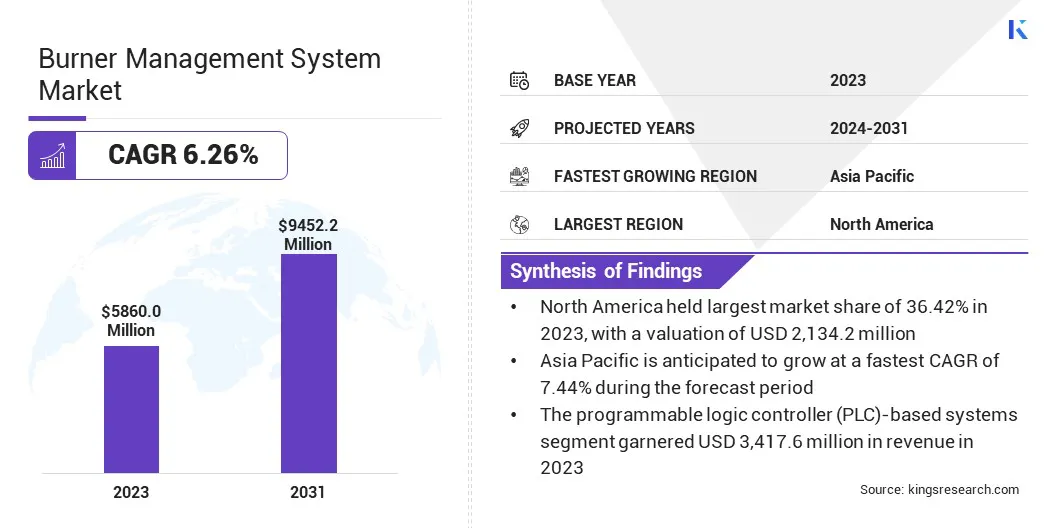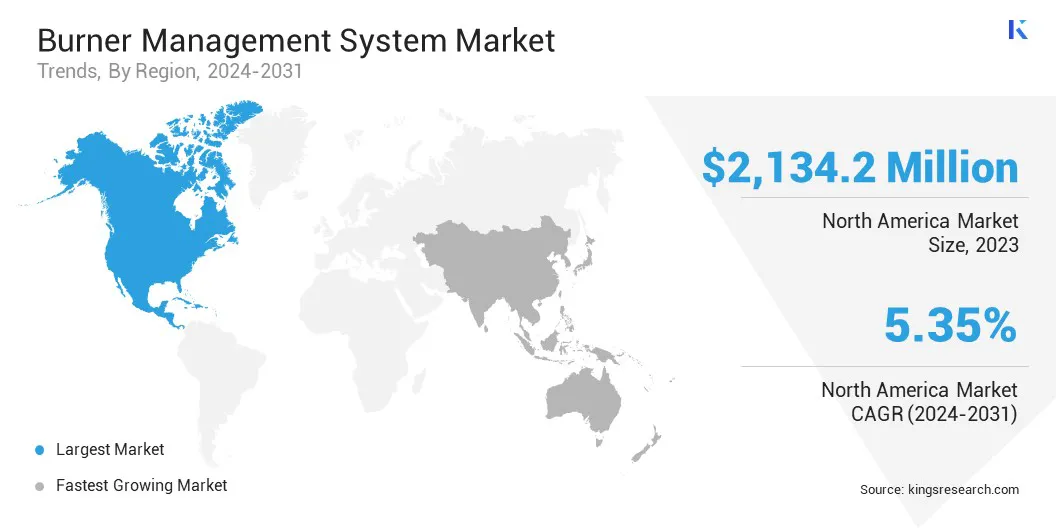Market Definition
A burner management system is a safety control system used in industrial applications, primarily in boilers, furnaces, and other combustion equipment, to ensure safe start up, operation, and shutdown of burners.
It is designed to prevent unsafe operating conditions, detect and mitigate hazardous situations, and enhance the overall efficiency and reliability of combustion processes.
Burner Management System Market Overview
The global burner management system market size was valued at USD 5,860.0 million in 2023 and is projected to grow from USD 6,179.5 million in 2024 to USD 9,452.2 million by 2031, exhibiting a CAGR of 6.26% during the forecast period.
This market is witnessing significant growth driven by the increasing focus on industrial safety, energy efficiency, and environmental sustainability. BMS is crucial in industries such as oil & gas and power generation for safe and efficient burner operation. Growing safety regulations and energy-saving needs are boosting demand for advanced BMS solutions.
Major companies operating in the global burner management system market are ABB, Honeywell International Inc., Schneider Electric, Emerson Electric Co., Rockwell Automation, Siemens AG, Pilz GmbH & Co. KG, Cimarron Energy, Inc., Babcock & Wilcox Enterprises, Inc., Yokogawa Deutschland GmbH, General Electric Company, Cleaver-Brooks, Combustex Corp., ACL Manufacturing Inc., and Born Inc.
Technological advancements, including digital controls, automation, and real-time monitoring, are further propelling market expansion. Additionally, rising concerns about reducing carbon emissions and improving environmental compliance are boosting the adoption of BMS, particularly in industries with high combustion risks.
- In November 2023, Toscotec announced plans to rebuild the drying section of PM1 at Rexcell’s Skåpafors mill in Sweden In 2024. The upgrade includes a press section, TT SYD Steel Yankee Dryer, and a high-efficiency TT Hood with an advanced burner management system (BMS) to optimize combustion efficiency. The project aims to reduce energy consumption and increase machine runability, supporting Rexcell's sustainability goals.

Key Highlights:
- The burner management system industry size was recorded at USD 5,860.0 million in 2023.
- The market is projected to grow at a CAGR of 6.26% from 2024 to 2031.
- North America held a share of 36.42% in 2023, valued at USD 2,134.2 million.
- The gas-fired systems segment garnered USD 3,384.2 million in revenue in 2023.
- The programmable logic controller (PLC)-based systems segment is expected to reach USD 5,572.9 million by 2031.
- The oil and gas segment is expected to reach USD 3,062.9 million by 2031.
- Asia Pacific is anticipated to grow at a CAGR of 7.44% through the forecast period.
Market Driver
"Growing Need for Safety and Risk Management"
The growing need for safety and risk management in industrial combustion processes, along with increasing demand for energy-efficient solutions and stringent environmental regulations, is fueling the growth of the burner management system market.
As industrial sectors such as oil & gas, power generation, and chemicals face increased risks associated with combustion, the demand for reliable BMS solutions to prevent accidents and ensure operational safety is rising.
Additionally, pressure to reduce energy consumption and optimize burner performance is boosting the adoption of advanced BMS technologies. Stricter emission standards are further prompting companies to rely on BMS to optimize combustion processes and minimize environmental impact.
- In April 2024, Valmet launched the Valmet DNAe, a next-generation distributed control system (DCS) designed to improve efficiency, sustainability, and safety. The web-based system features advanced cybersecure architecture, scalable performance, and flexible upgrade options for existing customers.
Market Challenge
"High Initial Installation and Maintenance Costs"
The burner management system market faces several challenges, including high initial installation and maintenance costs, complex integration with existing systems, and the need for specialized technical expertise. High upfront costs for advanced BMS solutions can hinder adoption by small and medium-sized enterprises.
To address this challenge, vendors can offer flexible pricing models or financing options to make BMS more accessible. The complexity of integrating BMS with legacy systems in older plants can lead to operational disruptions, which can be mitigated by providing robust integration support and offering modular, scalable solutions.
Additionally, the shortage of skilled personnel to manage and maintain BMS solutions can be overcome by investing in training programs, remote monitoring services, and partnerships with technology providers to ensure effective system management.
Market Trend
"Surging Adoption of Cloud-based Solutions"
The adoption of cloud-based burner management system solutions is increasing due to their ability to provide remote monitoring and control. With cloud integration, operators can access real-time data from anywhere, reducing the need for on-site personnel and making operations more efficient.
This shift allows industries to track burner performance, identify potential issues early, and make informed decisions without physically being present at the site. Additionally, predictive maintenance, fueled by data analytics and IoT sensors, is gaining traction for its ability to predict potential system failures, minimizing downtime and maintenance costs.
- For instance, in February 2024, Siemens announced the integration of generative artificial intelligence (AI) into its Senseye Predictive Maintenance solution. This advancement combines AI and machine learning to make predictive maintenance more conversational and intuitive, enhancing decision-making and boosting efficiency.
Additionally, AI-driven BMS technologies are being utilized to optimize combustion processes, enhance fuel efficiency, and improve overall performance by adapting to real-time conditions and adjusting burner operations automatically.
Burner Management System Market Report Snapshot
| Segmentation |
Details |
| By Fuel |
Gas-Fired Systems, Oil-Fired Systems |
| By Platform |
Programmable Logic Controller (PLC)-Based Systems, Distributed Control System (DCS)-Based Systems |
| By End-Use Industry |
Oil and Gas, Chemical & Petrochemical, Power Generation, Metals & Mining, Others |
| By Region |
North America: U.S., Canada, Mexico |
| Europe: France, U.K., Spain, Germany, Italy, Russia, Rest of Europe |
| Asia-Pacific: China, Japan, India, Australia, ASEAN, South Korea, Rest of Asia-Pacific |
| Middle East & Africa: Turkey, UAE, Saudi Arabia, South Africa, Rest of Middle East & Africa |
| South America: Brazil, Argentina, Rest of South America |
Market Segmentation:
- By Fuel (Gas-Fired Systems and Oil-Fired Systems): The gas-fired systems segment earned USD 3,384.2 million in 2023 due to the increasing adoption of natural gas for its lower emissions, higher efficiency, and cost-effectiveness in industrial combustion processes.
- By Platform (Programmable Logic Controller (PLC)-Based Systems and Distributed Control System (DCS)-Based Systems): The programmable logic controller (PLC)-based systems segment held a share of 58.32% in 2023, fueled by its cost-effectiveness, seamless integration, and reliable control for smaller to medium-scale industrial applications.
- By End-Use Industry (Oil and Gas, Chemical & Petrochemical, Power Generation, Metals & Mining, and Others): The oil and gas segment is projected to reach USD 3,062.9 million by 2031, largely attributed to the increasing demand for safe and efficient combustion management in exploration, refining, and production processes, along with stringent safety and environmental regulations.
Burner Management System Market Regional Analysis
Based on region, the market has been classified into North America, Europe, Asia Pacific, Middle East & Africa, and Latin America.

North America burner management system market accounted for a significant share of around 36.42% in 2023, valued at USD 2,134.2 million.
This dominant position is attributed to the region’s mature industrial landscape, stringent regulatory frameworks, and increased focus on operational safety, energy efficiency, and environmental compliance. The presence of key industries such as oil & gas, power generation, and manufacturing further propels the demand for advanced BMS solutions that enhance operational safety and efficiency.
Additionally, the increasing adoption of digital solutions, including AI, IoT, and predictive maintenance technologies, foster regional market growth
Asia Pacific burner management system industry is poised to grow at a CAGR of 7.44% over the forecast period. This growth is largely propelled by rapid industrialization, significant investments in energy infrastructure, and the rising demand for more efficient and environmentally sustainable combustion technologies.
Leading markets such as China, India, and Japan are contributing significantly to this expansion, with a strong emphasis on improving energy efficiency and adhering to stricter environmental regulations. The growing need for enhanced safety and compliance in sectors such as chemicals, petrochemicals, and power generation is further accelerating the adoption of BMS solutions in the region.
- In November 2024, Valmet announced the delivery of a modern lime kiln, including a multi-fuel burner and burner management system, to Kuantum Papers Limited in Punjab, India. The project, which also includes a satellite cooler, aims to increase production capacity. The lime kiln is designed for energy efficiency, utilizing both fossil and biomass fuels, enhancing sustainability and circularity in the chemical recovery process.
Regulatory Framework Also Plays a Significant Role in Shaping the Market
- In the U.S., the OSHA (Occupational Safety and Health Administration) regulates boiler safety standards, including those with burner management system (BMS). The National Fire Protection Association (NFPA) also develops safety codes for BMS.
- In Europe, BMS regulations are primarily governed by the European Committee for Standardization (CEN) under EN 746-2, which outlines safety requirements for industrial combustion systems. Additionally, IEC 61508 and IEC 61511 from the International Electrotechnical Commission (IEC) establish functional safety standards.
- In China, the State Administration for Market Regulation oversees industrial equipment safety, quality certification, and enforcement of burner systems.
- In Japan, the Ministry of Economy, Trade and Industry (METI), through its Industrial Safety division, oversees BMS by enforcing technical safety standards and oversseing high-pressure gas handling in industrial facilities.
Competitive Landscape
The burner management system industry is characterized by a large number of participants, including both established corporations and emerging players, all competing to offer innovative and efficient solutions. The market is highly dynamic, with companies focusing on technological advancements such as AI, IoT integration, and cloud-based platforms to meet growing industrial demand.
These players are also responding to the increasing emphasis on safety, energy efficiency, and regulatory compliance by developing cutting-edge BMS solutions.
The competitive landscape is further shaped by strategic partnerships, acquisitions, and collaborations aimed at expanding product portfolios and reaching broader customer bases across different industrial sectors. The market is experiencing sustained growth mainly fueled by the adoption of smarter, more integrated systems.
List of Key Companies in Burner Management System Market:
- ABB
- Honeywell International Inc.
- Schneider Electric
- Emerson Electric Co.
- Rockwell Automation
- Siemens AG
- Pilz GmbH & Co. KG
- Cimarron Energy, Inc.
- Babcock & Wilcox Enterprises, Inc.
- Yokogawa Deutschland GmbH
- General Electric Company
- Cleaver-Brooks
- Combustex Corp.
- ACL Manufacturing Inc.
- Born Inc.
Recent Developments (M&A /Agreements)
- In December 2024, Siemens Smart Infrastructure acquired Danfoss Fire Safety, a Denmark-based specialist in fire suppression technology. The acquisition enhances Siemens’ fire safety portfolio with high-pressure water mist and low-pressure CO₂ systems, supporting global growth and advancing sustainable fire suppression solutions.
- In December 2024, ClearSign Technologies Corporation and Zeeco, Inc. expanded their collaboration to launch a co-branded process burner line that reduces industrial emissions. The new burners, featuring ClearSign Core technology, operate on 100% natural gas and hydrogen while maintaining sub 5 ppm NOx emissions to meet strict regulations.
- In August 2024, Valmet announced the delivery of a recovery boiler, an ash crystallization plant, and an odorous gas handling system to Klabin’s Monte Alegre mill in Brazil as part of its modernization project. The equipment incorporates advanced automation and flow control solutions.


